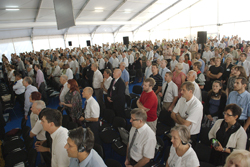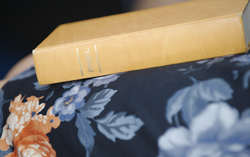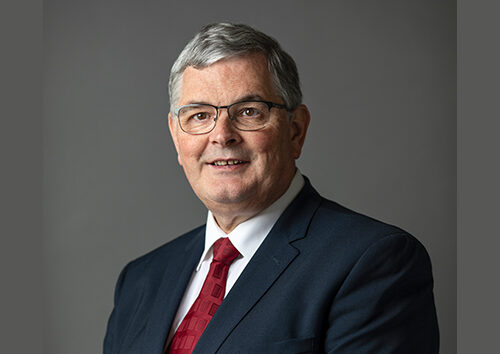Presented by Artur Stele
25 August 2012, Rogaška Slatina, Slovenia [Julian Hibbert , tedNEWS] A really good-sized crowd turned out to listen to Artur Stele, a General Conference vice-president, in spite of soaring Slovenian temperatures and a failing air-conditioning system in the auditorium.
“What an awesome task we have, to make God known in post-modern, secular Europe,” were Artur Stele’s opening comments. According to him, “we now live at a time when the only respected authority is the individual’s personal desires.” He sees this time in history as similar to that recorded in Judges: “In those days Israel had no king; everyone did as they saw fit.” Judges 21:25, NIV
It was for this reason that he turned our attention to the book of Ruth, a small book that describes what happened during one segment of the Judges period. He regards it as a “jewel of biblical literature – a treasure of thought and language.”
But there is more to the book than we are used to, and two of its major themes are mercy and the guidance of God.
Stele then dug into Ruth, asking his audience to bear this in mind as he did: “The providences of God are like Hebrew words – they can only be understood properly when you read them backwards.”
Firstly, he showed that Naomi’s husband, Elimelech, has significance in the narrative. His name means “God is my king” – and this at a time when Israel had no earthly monarch and men did as they pleased. It was clear that some of His people still upheld His sovereignty. Secondly, he showed that Elimelech and his family were from Bethlehem, which means ‘house of bread’: “They were Ephrathites from Bethlehem, Judah. And they went to Moab and lived there.” Ruth 1:2, NIV
 The irony of this is that we here find God’s people forced to leave their home – the ‘house of bread” – to seek bread among foreigners! The irony deepens when one remembers that God’s people were seriously snubbed by the Moabites during their migration to Canaan: “No Ammonite or Moabite or any of their descendants may enter the assembly of the Lord, not even in the tenth generation. For they did not come to meet you with bread and water on your way when you came out of Egypt…” Deuteronomy 23:3-4, NIV
The irony of this is that we here find God’s people forced to leave their home – the ‘house of bread” – to seek bread among foreigners! The irony deepens when one remembers that God’s people were seriously snubbed by the Moabites during their migration to Canaan: “No Ammonite or Moabite or any of their descendants may enter the assembly of the Lord, not even in the tenth generation. For they did not come to meet you with bread and water on your way when you came out of Egypt…” Deuteronomy 23:3-4, NIV
Bread was not the only thing that was scarce in Israel in those days of the Judges. In 1 Samuel 3:1 we learn that in “those days the word of the Lord was rare; there were not many visions.” So there was a famine of the “bread of life” as well.
Stele then drew the times of the judges into a direct comparison with ours, based on the reality that both Israel then, and modern Europe today, display the spirit of post-modernism. Could the reason why this spirit flourished be that ‘the word of the Lord was rare’ in those days? Similarly, could that be the reason that post-modernism flourishes here today? Could it be that there is no “bread of life” in the “house of bread”? Is it possible that because people are not getting what they need from us in church, they are seeking it on the internet and elsewhere?
Stele then told about something he had heard during Moldova’s 110th anniversary of Adventism – in the biggest hall in the country – filled with our members and government officials from everywhere. One of those senior officials congratulated them for preaching faithfully for 110 years – then told them the story of a ten-year old boy who wrote a letter to God. He told God how poor his family was, and then asked Him to send him 100 lays (local currency) so he could help his mother care for them. He addressed the letter “To God” and when it arrived at the post office they didn’t know what to do with it. Someone suggested that they send it to the parliament to deal with, after all, they were the land’s highest authority.
After much discussion the parliament decided to send him 10 lays. After the passing of some time, another letter “To God” arrived from the young man and was referred again to the august body. This time the boy expressed gratefulness for the 10 lays, but added the suggestion that if God sent a 100 lays directly it would be better than sending it through the parliament – because they kept 90 lays and only gave him 10!
Stele then asked these questions to drive his point home: “Are we not also like them? Are we only delivering a small percentage of what the world should hear from God?”
Going back to the text, Dr. Stele referred to the return of Naomi to Bethlehem: “When Naomi heard in Moab that the Lord had come to the aid of his people by providing food for them, she and her daughters-in-law prepared to return home from there.” Ruth 1:6, NIV Interestingly, the ‘food’ being referred to here is a translation of the word “bread” in the original. Naomi can now return to the ‘house of bread” because there is “bread” in that house again!
So as soon as there is ‘bread’ in God’s house again, it will attract His people to Him. To reach Europe we need to provide that ‘bread of life”– it is the only thing that will draw the people of this continent away from their post-modern values.
 Recent research has shown some unexpected things about the “reasons why people stay in church”. It was expected that things like music and fellowship would rank at the top of the list. But the survey revealed that the top reason for people to remain in church was “biblical preaching”! People are hungry for the “bread of life”, both inside and outside the church.
Recent research has shown some unexpected things about the “reasons why people stay in church”. It was expected that things like music and fellowship would rank at the top of the list. But the survey revealed that the top reason for people to remain in church was “biblical preaching”! People are hungry for the “bread of life”, both inside and outside the church.
When Stele took the audience back to the text he quoted this: “When Ruth came to her mother-in-law, Naomi asked, ‘How did it go, my daughter?’ Then she told her everything Boaz had done for her and added, ‘He gave me these six measures of barley, saying, “Don’t go back to your mother-in-law empty-handed.”’” These are the last reported words of Naomi. It is interesting to note that she starts off empty handed in Ruth 1:21 but that her hands are full and overflowing at the end.
Not only did God satisfy Naomi’s hunger, but he also blessed her descendants as well – David was anointed in Bethlehem (the “house of bread”) and Jesus was born in the “house of bread” as well. He later claimed to be “the bread of life”, who would eventually resurrect her husband and her sons.
 At the beginning of the book of Ruth two young women are called to make decisions – Ruth makes the right one, remains in the story and writes herself into the lineage of Christ – Orpha makes the wrong one and her name is not mentioned again.
At the beginning of the book of Ruth two young women are called to make decisions – Ruth makes the right one, remains in the story and writes herself into the lineage of Christ – Orpha makes the wrong one and her name is not mentioned again.
At the end of the book two men are each faced with a decision. Boaz make the right one, accepts God’s challenge and writes himself into salvation history – the other man, known only as “so-and-so”, makes the wrong decision and remains unnamed forever.
So, as Dr. Stele sees it, our challenge is to make God known in Europe and to find an answer to the values of the post-modern mindset that originated here and has been adopted around the world.
The choice is ours, but if we make the wrong choice we will disappear from history like Orpha and “so-and-so”!
“Is there bread in the ‘house of bread’?” [tedNEWS]
tedNEWS Staff: Miroslav Pujic, director; Deana Stojkovic, editor; Dragana Selakovic-Duval; Frederic Duval & Tor Tjeransen, photographers
119 St Peter’s Street, St Albans, Herts, AL1 3EY, England
E-mail: [email protected]
Website: www.ted-adventist.org
tedNEWS is an information bulletin issued by the communication department of the Seventh-day Adventist Church in the Trans-European Division.
You are free to re-print any portion of the bulletin without need for special permission. However, we kindly request that you identify tedNEWS whenever you publish these materials.


